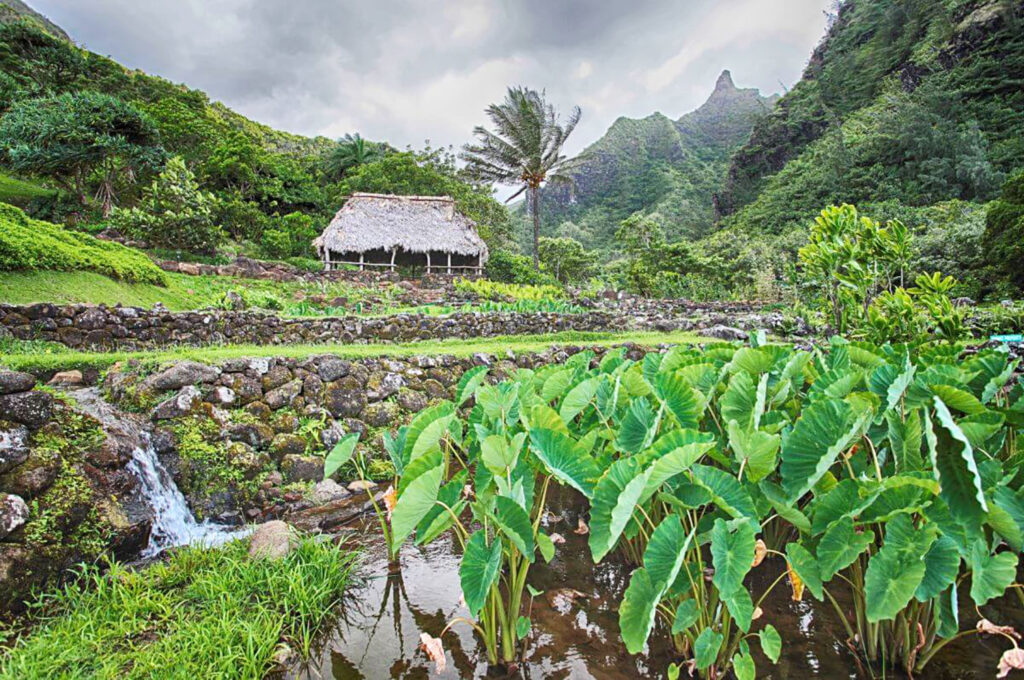Once upon a time Hawai’i had a unique eco-civilization that was decimated by colonization. Fortunately, it is being reclaimed “by environmental literacy that the people of Hawaiʻi never lost,” according to Kawika Winter, a biocultural ecologist at the University of Hawaiʻi at Mānoa focused on conservation, sustainability, and Indigenous rights. They are seeking to bring about biocultural restoration, which “aims to reconnect People and Place to biodiversity.” We are deeply moved by the values and practices, so we want to celebrate it as part of AANHPI Heritage Month.
The aim of biocultural restoration has been to protect essential habitats and restore the ancestral agroecology and aquaculture systems. “These efforts have empowered communities around Hawaiʻi to be more self-sustaining, and they have inspired people around the world,” according to Winter. He believes eco-civilizations may hold a key to addressing climate change, as he shares with Terra Lingua. “Environmental literacy allowed highly advanced Indigenous societies to use ecomimicry to develop systems (agroecology and aquaculture) that conserved or enhanced essential habitats in the process of food production rather than destroy them as agriculture does. Importantly, each community produced its own food, and thus the entire population lived within the constraints of island systems of limited resources,” shares Winter.
“Hawaiʻi is an island system that is the most remote landmass on the face of the planet, and researchers have long viewed it as a model system. Under Indigenous stewardship and governance, Hawaiʻi developed into an eco-civilization,” he continues. “Its integrated agroecosystems and aquaculture systems once sustained a population of more than a million people, which is about the size of its population today.”
“In spite of limited resources, Hawaiians thrived through the development of an abundance mindset known as ʻāina momona (literally, plump land).” Technologically advanced agroecology and aquaculture facilitated a sustainable superabundance of food by harnessing ecosystem function to increase nature’s productivity.
Perhaps the most important lesson we can learn from Hawai’i right now is encapsulated in a single word, kuleana. Winter emphasizes, “Kuleana is a Hawaiian word that, through the colonizing American lens, is often translated as rights. In the Hawaiian language, however, the concept of rights as viewed in American culture doesn’t exist. Kuleana is more accurately understood to mean responsibilities. There is a broad-based movement among Hawaiian scholars and community leaders to reclaim this ancestral conceptualization of the word.”
“One example of this effort is the lawaiʻa pono (literally, fishing in balance) movement, which supports a return to community-based fishery management in Hawaiʻi. It shifts the default notion of fishing from the extractive form of take that dominates today, to an approach that focuses on taking care,” explains Winter. “In this Indigenous approach, the first action isn’t extractive; rather, it is a regenerative action that honors the relationship between people and the ocean.”
Winter powerfully concludes, “This give-before-take approach — founded in the spirit of aloha — focuses on the responsibility to care for all relationships to the benefit of the collective, rather than on an individual’s rights to take at the expense of the collective. This notion permeated ancient Hawaiian society and was at the very foundation of the Hawaiian eco-civilization.”

